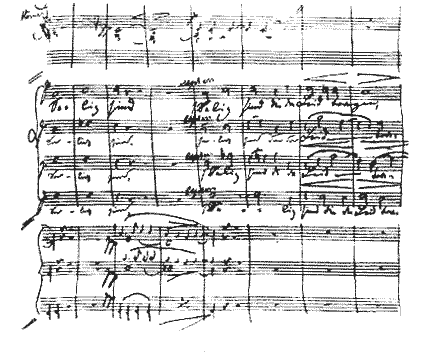
Program Notes and Choral Texts for Brahms: A German Requiem

Program Notes and Choral Texts for Brahms: A German Requiem
A GERMAN REQUIEM -Johannes Brahms
Up until about
1820, Brahms' music was quite commonly
criticized, by sophisticated critics as well as ordinary music lovers, as
cold, abstract, pedantic. George Bernard Shaw once characterized the
German Requiem as an advertisement for a mortuary.
There is however a very different way of looking at Brahms'
technical scruples. As every lover of his songs knows, his gift was
primarily lyrical. Thus Brahms had to rely on a genuine union of his
naturally outpouring inspiration with compulsive technical aesthetic
considerations.
All this helps
explain the curiously static career of Brahms, who
did not evolve in the "organic" manner of other great German
composers. "His development was not expansive, but rather was to a
great extent intensive. His works become with more maturity more and
more terse, dense, and close-measured gaining an increasingly somber
and unceremonious emotional expression."
"A German
Requiem, after the language of the Holy Writ, for
soloists, chorus, and orchestra (organ ad libitum)" has a long,
complex history, beginning with the first event of Brahms' musical
adulthood (his meeting Robert Schumann in September 1853) and
continuing through 1868 when, on Good Friday at Bremen Cathedral, 6
of the 7 movements were petformed, and people began to consider
Brahms a contemporary master.
It has often been
pointed out that Brahms' Requiem has only the
name in common with the Catholic requiem form, with its Latin text and
vocal quartet pleading for intercession on behalf of the dead in
Purgatory. He deliberately did not choose Biblical texts naming Christ
in the original German. All this suggests that his work is not Christian
in any orthodox sense. It is more concerned with the living than with
the salvation of the dead. In choosing passages from Luther's translation
of the Bible, (passages in which he did not literally believe) Brahms
seems to affirm the enduring value of Judeo-Christian traditions. And
in imitating 17th and 18th century musical techniques and the grandeur
of inspiration of Bach, Beethoven, and Schumann, Brahms states as
forcefully as he can that the power of music is undying and holy and that
the purpose of art is to meld past, present and future in a cauldron of
emotional and intellectual glory.
Text:
I. Chorus
Blessed are they that mourn:
for they shall be comforted.
-Matthew 5
They
that sow in tears
shall reap in joy.
They go forth and weep,
and bear precious seed,
and shall come again with rejoicing
bringing their sheaves with them.
-PSALM 126
II. Chorus
For all flesh is like grass,
and all its glory like the flower of grass.
The grass withers,
and the flower falls... -I PETER I
Be patient, therefore, beloved
until the coming of the Lord.
The farmer waits
for the precious crop from the earth
being patient with it
until it receives
the early and the late rains.
You also must be patient. -JAMES 5
III. Baritone
& Chorus
Lord, let me know my end,
and what is the measure of my days;
let me know how fleeting my life is.
You have made my days a few handbreaths,
and my lifetime is as nothing in your sight.
Surely everyone stands as a mere breath.
Surely everyone goes about like a shadow.
Surely for nothing they are in turmoil;
they heap up, and do not know
who will gather them.
And now, 0 Lord, what do I wait for?
Mr hope is in Thee. -PSALM 39
IV. Chorus
How lovely is your dwelling place,
O Lord of hosts!
My soul longs, indeed it faints
fOr the courts of the Lord;
my heart and my flesh sing for joy
to the living God.
Happy are those who live in your house.
ever singing your praise. -PSALM 84
V. Soprano &
Chorus
Ye now are sorrowful;
but I will see you again,
and your hearts will rejoice,
and no one will take your joy from you.
-JOHN 16
As a mother comforts her child
so will I comfort you.I
Behold with your eyes: but for a little
have I known SorrOW and labor
and found much rest. -ECCLESIASTICUS 51
VI. Baritone
& Chorus
For here have we no continuing place,
but we seek one that is to come.
-HEBREWS 13
Behold, I show you a mystery:
we shall not all sleep,
but we shall all be changed;
in a moment, in the twinkling of an eye,
at the hour of the last trumpet.
For the trumpet shall sound,
and the dead shall be raised incorruptible,
and we shall be changed.
Then shall be brought to pass
the saying that is written:
Death is swallowed up in victory.
0 death, where is thy sting?
0 grave, where is thy victory?
-I CORINTHIANS 15
You are worthy, our Lord and God,
to receive glory and honor and power,
for you created all things,
and by your will they existed
and were created. -REVELATI0N 4
VII. Chorus
Blessed are the dead
who from now on die in the Lord.
"Yes," says the Spirit,
"they will rest from their labors.
for their deeds follow them."
-REVELATI0N 14